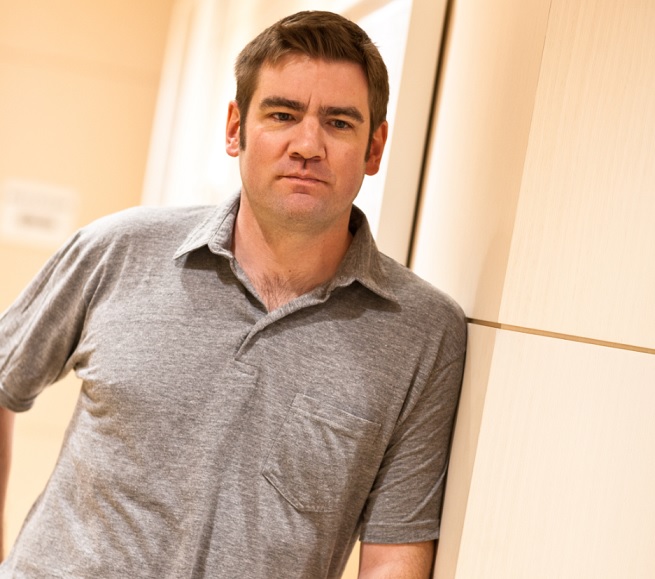Chris Dixon isn’t known as a game investor. But as both an angel investor and a partner at Netscape pioneer Marc Andreessen’s venture capital firm Andreessen Horowitz, he has made some very early and smart investments in game companies. That gives him a perspective on the disruption that is happening in games, but it also means he isn’t a cheerleader for everything happening in the industry.
The roster of investments includes Oculus VR, where Andreessen Horowitz led a $75 million round in the hot virtual reality goggles startup. He also personally invested in Kickstarter, which has remade the landscape for game finance. And other game-related investments include TrialPay and Omgpop (acquired by Zynga for $180 million-plus). Andreessen Horowitz has also invested in Anki, Zynga, Tiny Speck, and TinyCo.
Outside of games, Dixon also founded Hunch and sold it to eBay. And he invested in Hipmunk, Pinterest, Foursquare, Codecademy, Optimizely, Skype, and MakerBot. He’s also excited about Bitcoin. We caught up with him recently to talk about investing in games in the broader context of tech investing.
GamesBeat: I wanted to pick your brain about the gaming angles that are interesting to you. You seem to have one foot in the game business and one foot in the tech business. What’s your perspective on games as a result of that?
Chris Dixon: I’m personally interested in video games. I’ve played a lot of them over my life. I don’t see myself as a game investor, but I’ve made some investments that are related to games. In the case of Oculus, for example, part of why we’ve invested is because it’s not only valuable for gaming, but because it’s something that can go far beyond games. I like gaming a lot, but I consider it more of something adjacent to my main professional focus.
I first got into computers trying to program video games, and I’ve enjoyed all the consoles. I’m into it, and I think it’s important. To me, I think there are two opposing trends in gaming right now. You have the consoles and the high-end games versus the Angry Birds, mobile stuff. I play iOS games and I think they’re fun, but to me it feels like they’re mostly time-wasters. Sometimes they get coercive in the way they do in-app purchases and things.
I’m personally more interested in the richer game experiences that interact almost with artistic sensibilities. Something like Oculus fits right into that. It’ll hopefully be a new avenue of creativity for game developers.
GamesBeat: Does gaming relate to some things that you cover very closely?
Dixon: I generally do consumer, internet, a bit of hardware. Certainly to some extent I’ve worked with games in the past. I was a personal investor in Omgpop. I’m not saying it’s not interesting. But there are some VCs that are video-game-focused, and that’s not me.
GamesBeat: A lot of the triple-A game developers seem worried that their craft is going away, that it’s going to be subsumed by mobile games. But it seems like Oculus is something that’s coming in almost orthogonally to that.
Dixon: Yeah, I don’t think that’s going away. With the consoles, you have a small number of titles that consume the vast majority of game development budgets. I’d be curious about your perspective, but with this generation of consoles, they’re technical improvements, but I don’t see them being nearly as dramatic as the last console transitions. I do think something new has to come along. Obviously we think and hope that something will be Oculus.
In a lot of ways, mobile games have simply grown the market, and not necessarily taken away from triple-A. They’ve brought gaming to a larger set of people. Meanwhile, triple-A, because of the dynamics of the consoles and the huge budgets involved, has condensed to this relatively limited number of games that appeal to hardcore gamers. Something fresh has to come along for the triple-A guys.
When you try Oculus, you really get a sense that it’s a new medium, in the same way that film was a new medium at one point. We don’t know what will work and what won’t. It’s clear that just taking a first-person shooter and porting it over isn’t going to be the best experience. It’s very emotionally intense, to the extent that a game like a shooter might be overwhelming for a lot of people. We might have games that are more dramatic, or more about the environment and the atmosphere.
But the exciting part is, like I say, we don’t really know. If you’re a creative developer, it’s great to have a new medium like that. That’s a lot of why it’s touched people’s imaginations. It’s a whole new fresh set of things to develop.
GamesBeat: What do you think about the hurdles they face? There’s definitely challenges in building a new ecosystem here, something that’s so different from what’s already established.
Dixon: That’s true. As you know, the budgets for console games are massive. I’d think that only when it’s such a leap forward into a new experience would it make sense to try something like this. Certainly for us, an important investing signal was the excitement level among developers. Because it’s captured their imaginations, we think that will make it significantly easier to get people to build great stuff for the Oculus.
GamesBeat: Is there some way you can help people understand how you go about valuing a company like Oculus? It was a very large funding from a gaming point of view.
Dixon: In our business, we look for companies that can be new franchises, new multibillion-dollar technology companies. That’s the way our fund is structured and our business model is structured. We’re looking for companies that wouldn’t be acquired by other companies, but that instead would be large, stand-alone, independent companies with significant revenues and profits.
These are speculative investments, so there’s no science to figuring out how much it’s worth. It’s more about, “Do we have a compelling story where this is an important franchise technology company? Can we invest early enough that if it is, we can make significant profit from our investment?” We work backwards like that.
GamesBeat: “Disruption” is the word that’s been thrown around by every single game startup in the last five years. Clearly you guys haven’t invested every time you’ve heard that.
Dixon: There are different areas of investment. There’s game technology, game platforms. There are games themselves. A lot of games, as you know, it tends to be hit-driven. It’s harder to create sustained franchises. The other challenge for us is that a lot of the publishers have been the investors there, historically. They have specific expertise around seeing what games will be successful and what won’t. For us it’s just not our focus.
On the tech and platform side, there have been very few really ambitious game platforms, at least that I’ve seen come to us.
 GamesBeat: Kickstarter was one of your investments. That’s brought a lot of disruption into the way games get funded.
GamesBeat: Kickstarter was one of your investments. That’s brought a lot of disruption into the way games get funded.
Dixon: I love Kickstarter. I think it’s a great investment, but it’s also brought a lot of positive movement to a bunch of different areas. The most interesting to me, probably, is the independent games side. That crowdfunding model really works well there. Most of the people who support these game projects tend to be game enthusiasts who follow the creators and the people they’re backing. They’re excited to be part of the development process and get updates. The model works especially well for games.
GamesBeat: It seems like the community-building and the feedback on an idea are just as important.
Dixon: Yeah. They feel like they’re actually becoming part of it, as opposed to simply purchasing it. Also, an important economic effect of Kickstarter — with games, a little bit like movies, you’re getting this bifurcation, where you have $100 million games budget and then you have independent Flappy Bird stuff. Kickstarter is one of the few things that’s propping up the middle, where you might have just a couple million dollars in your budget. It’s not triple-A, but it’s not Flappy Bird. That’s an important part of the development world.
GamesBeat: I don’t think you guys have stepped into the microconsoles yet, but does that appeal to you in any way — that Android in the living room might also be disruptive for games?
Dixon: It’s interesting, that experience. I don’t know if we’ve seen a company come to us. A lot of our relationships, we don’t start them. We invest or not when they come to us.
GamesBeat: They don’t seem to have set the world on fire just yet.
Dixon: I understand what they’re doing. I think what might happen there — one theory is that it’ll just be your phone kind of clone-casting or AirPlaying onto the screen. You won’t need a separate device. Or maybe it’ll be a Steam Box. But for one reason or another we haven’t gotten involved there.




